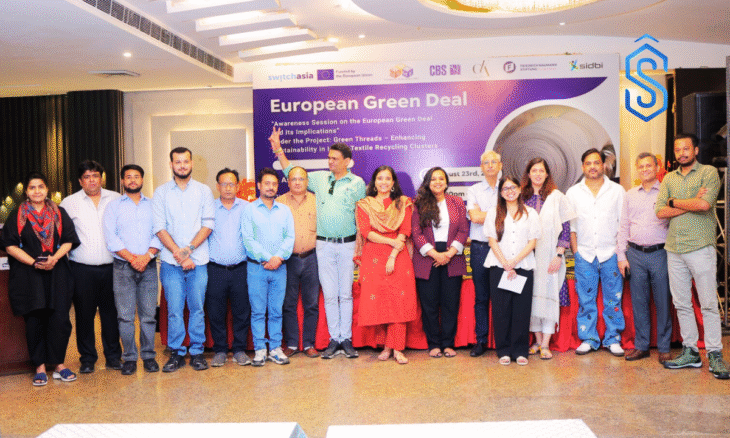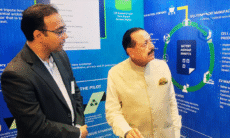Panipat: The Foundation for MSME Clusters (FMC), acting as the implementing partner of the Green Threads programme funded by the European Union under its SWITCH-Asia initiative, has organized a key workshop in collaboration with the Panipat Exporters Association.
The event, held at Days Hotel by Wyndham, Panipat, aimed to prepare exporters for compliance with the European Union’s evolving sustainability requirements in textiles and apparel, with a strong focus on traceability and environmental accountability.
Foundation for MSME Clusters Workshop Highlights Sustainability Mandates
The workshop brought together industry leaders including Lalit Goyal (Panipat Exporters Association), Vinod Dhamija (Haryana Chamber of Commerce and Industry), Rajat Grover (Young Entrepreneurs Society), Puran Rawal (Young Entrepreneurs Society), Parvinder Singh (Global Alliance for Textile Sustainability), and Nitin Arora (Dyer Association). Their participation underscored the industry’s united support for Panipat’s green transition.
Also Read: Gender Budgets, Startups, and MSMEs Fuel Women Empowerment in India’s Growth Story
Opening the session, Mukesh Gulati, Executive Director of the Foundation for MSME Clusters, stressed the importance of aligning Panipat’s exporters with international sustainability frameworks. He reiterated FMC’s long-term commitment to supporting Panipat’s textile ecosystem and driving its evolution into a global hub for sustainable and circular textiles.
Foundation for MSME Clusters Driving EU-Compliance Through Green Threads
The textile industry contributes significantly to global environmental challenges, generating nearly 10% of global carbon emissions, 20% of wastewater, and 92 million tonnes of textile waste annually. In response, the EU has enforced strict sustainability and circularity regulations, including eco-design, product durability, and Digital Product Passport (DPP) requirements.
For Panipat – a hub that recycles a large portion of India’s textile waste – these guidelines are both regulatory necessities and opportunities to modernize operations and strengthen export competitiveness.
International experts contributed key insights during the workshop:
- Harshita (Global Fashion Agenda): EU textile strategy, eco-design rules, and Digital Product Passport (DPP).
- Ina Bahungna (Reverse Resources): Traceability mechanisms for Extended Producer Responsibility (EPR).
- Chinky Yadav (Green Story): Lifecycle tracking through DPP for sustainability reporting and accountability.
Green Threads Consortium and the Role of Foundation for MSME Clusters
The EU-funded Green Threads programme in Panipat is delivered by a consortium of partners:
- Foundation for MSME Clusters (FMC) – implementing partner for Panipat.
- Copenhagen Business School (CBS) – research on sustainability branding and traceability.
- Small Industries Development Bank of India (SIDBI) – enabling green financing for MSMEs.
- Global Fashion Agenda (GFA) – driving policy and industry engagement.
- Reverse Resources – providing advanced traceability technology.
Also Read: RAMP Programme: India Post and MSSIDC Sign MoU to Boost MSME Competitiveness in Maharashtra
Together, the consortium seeks to establish Panipat as a global sustainable textile hub, promote the adoption of the Digital Product Passport, enhance MSME skills for resource efficiency, and widen access to green financing.
About the Foundation for MSME Clusters
Established in 2005, the Foundation for MSME Clusters (FMC) is a leading non-profit organization dedicated to promoting sustainable livelihoods and environmental innovation. FMC has worked with more than 300 MSME clusters and supported over 100,000 units across India, implementing projects with support from NABARD, UNIDO, UNDP, EU, ADB, and leading corporates. As a nodal agency with India’s Ministry of MSME and Ministry of Rural Development, FMC has been instrumental in advancing sustainable cluster development across diverse industries.






